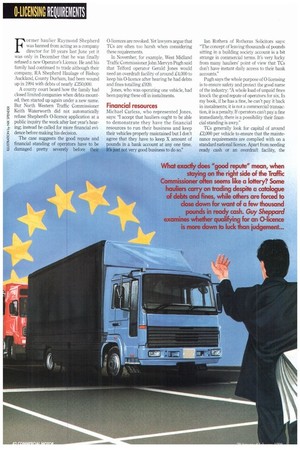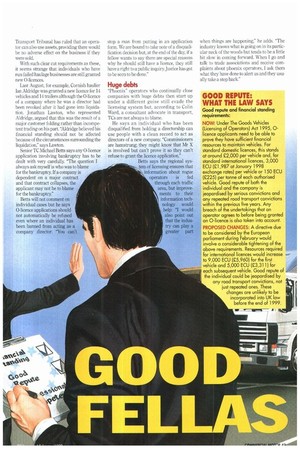0-LICENSING REQUIREMENTS What exactly does "good repute" mean, when staying
Page 46

Page 47

If you've noticed an error in this article please click here to report it so we can fix it.
on the right side of the Traffic Commissioner then seems like a lottery? Some hauliers carry on trading despite a catalogue of debts and fines, while others are forced to close down for want of a few thousand pounds in ready cash. Guy Sheppard examines whether qualifying for an 0-licence is more clown to luck than judgement... Former haulier Raymond Shepherd was banned from acting as a company director for 10 years last June yet it was only in December that he was finally refused a new Operator's Licence. He and his family had continued to trade although their company, RA Shepherd Haulage of Bishop Auckland, County Durham, had been wound up in 1994 with debts of nearly £250,000.
A county court heard how the family had closed limited companies when debts mounted, then started up again under a new name. But North Western Traffic Commissioner Keith Waterworth did not automatically refuse Shepherd's 0-licence application at a public inquiry the week after last year's hearing; instead he called for more financial evidence before making his decision.
The case suggests the good repute and financial standing of operators have to be damaged pretty severely before their 0-licences are revoked. Yet lawyers argue that TCs are often too harsh when considering these requirements In November, for example, West Midland Traffic Commissioner John Mervyn Pugh said that Telford operator Gerald Jones would need an overdraft facility of around £4,000 to keep his 0-licence after hearing he had debts and fines totalling £920.
Jones, who was operating one vehicle, had been paying these off in instalments.
Financial resources
Michael Carless, who represented Jones, says: "I accept that hauliers ought to be able to demonstrate they have the financial resources to run their business and keep their vehicles properly maintained but! don't agree that they have to keep X amount of pounds in a bank account at any one time. It's just not very good business to do so."
Ian Rothera of Rotheras Solicitors says: 'The concept of leaving thousands of pounds sitting in a building society account is a bit strange in commercial terms. It's very lucky from many hauliers' point of view that TCs don't have instant daily access to their bank accounts."
Pugh says the whole purpose of 0-licensing is to ensure safety and protect the good name of the industry: "A whole load of unpaid fines knock the good repute of operators for six, In my book, if he has a fine, he can't pay it back in instalments; it is not a commercial transaction, it is a penalty. If operators can't pay a fine immediately, there is a possibility their financial standing is awry."
TCs generally look for capital of around £2,000 per vehicle to ensure that the maintenance requirements are complied with on a standard national licence. Apart from needing ready cash or an overdraft facility, the Transport Tribunal has ruled that an operator can also use assets, providing there would be no adverse effect on the business if they were sold.
With such clear cut requirements as these, it seems strange that individuals who have run failed haulage businesses are still granted new 0-licences Last August, for example, Cornish haulier Ian Aldridge was granted a new licence for 14 vehicles and 14 trailers although the 0-licence of a company where he was a director had been revoked after it had gone into liquidation. Jonathan Lawton, who represented Aldridge, argued that this was the result of a major customer folding rather than incompetent trading on his part. "Aldridge believed his financial standing should not be affected because of the circumstances surrounding the liquidation," says Lawton.
Senior IC Michael Betts says any 0-licence application involving bankruptcy has to be dealt with very carefully. "The question I always ask myself is who was to blame for the bankruptcy. If a company is dependent on a major contract and that contract collapses, the applicant may not be to blame for the bankruptcy" Betts will not comment on individual cases but he says 0-licence applications should not automatically be refused even where an individual has been banned from acting as a company director. "You can't stop a man from putting in an application form. We are bound to take note of a disqualification decision but, at the end of the day, if a fellow wants to say there are special reasons why he should still have a licence, they still have a right to a public inquiry Justice has got to be seen to be done."
Huge debts
"Phoenix" operators who continually close companies with huge debts then start up under a different guise still evade the licensing system but, according to Colin Ward, a consultant advocate in transport, TCs are not always to blame.
He says an individual who has been disqualified from holding a directorship can use people with a clean record to act as directors of a new company. "Commissioners are hamstrung; they might know that Mr X is involved but can't prove it so they can't refuse to grant the licence application."
Betts says the regional system of licensing ensures that information about rogue operators is fed through each traffic area, but improvements to their information technology would help: "I would also point out that the industry can play greater parI when things are happening," he adds. "The industry knows what is going on in its particular neck of the woods but tends to be a little bit slow in coming forward. When I go and talk to trade associations and receive complaints about phoenix operators, I ask them what they have done to alert us and they usually take a step back."
GOOD REPUTE WHAT THE LAW SAYS
Good repute and financial standing requirements:
NOW: Under The Goods Vehicles (Licensing of Operators) Act 1995, 0licence applicants need to be able to prove they have sufficient financial resources to maintain vehicles. For standard domestic licences, this stands at around £2,000 per vehicle and, for standard international licences, 3,000 ECU (21,987 at January 1998 exchange rates) per vehicle or 150 ECU (£225) per tonne of each authorised vehicle. Good repute of both the individual and the company is jeopardised by serious convictions and any repeated road transport convictions within the previous five years. Any breach of the undertakings that an operator agrees to before being granted an 0-licence is also taken into account.
• PROPOSED CHANGES: A directive due to be considered by the European parliament during February would involve a considerable tightening of the above requirements. Resources required for international licences would increase to 9,000 ECU (£5,960) for the first vehicle and 5,000 ECU (£3,311) for each subsequent vehicle. Good repute of the individual could be jeopardised by any road transport convictions, not just repeated ones. These changes are unlikely to be incorporated into UK law before the end of 1999.












































































































